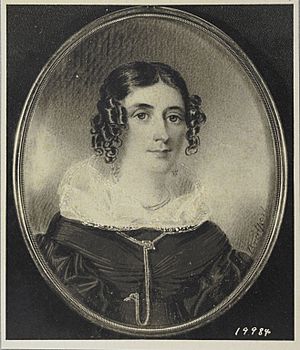Jacob Broom facts for kids
Jacob Broom (born October 17, 1752 – died April 25, 1810) was an important American leader, businessman, and politician from Wilmington, Delaware. He is known as one of the Founding Fathers because he helped create the United States. He was a special representative, called a delegate, at the U.S. Constitutional Convention in 1787. There, he signed the United States Constitution, which is the main rulebook for the country.
He was also chosen to be a delegate for another meeting, the Annapolis Convention in 1786, but he didn't go. Jacob Broom also served in the government of his home state, the Delaware General Assembly. His son, James M. Broom, and grandson, Jacob Broom, also became congressmen.
Contents
Early Life and Family
Jacob Broom's father was James Broom, who started as a blacksmith and later became a successful farmer. His mother was Esther Willis, who was a Quaker. In 1773, Jacob Broom married Rachel Pierce. They had eight children together.
Helping Create the Constitution
Even though Jacob Broom wasn't very involved in national politics before the Constitutional Convention, he strongly believed in having a powerful central government for the country. When George Washington visited Wilmington in 1783, Broom encouraged him to help bring the new states together. He felt this unity was important for the country's freedom and success.
Broom took these strong beliefs with him to Philadelphia for the Constitutional Convention. He always voted for ideas that would create a strong government. This government, he believed, should listen to the needs of the states. He thought that members of the Senate should serve for nine years. He also wanted states to pay their representatives in Congress. He believed Congress should have the power to stop state laws if needed.
Jacob Broom also wanted state governments to choose the electors who pick the president. He even thought the president should hold office for life. Broom attended almost every meeting of the Convention. He spoke up several times about important issues. However, he let more experienced delegates do most of the talking. A delegate from Georgia, William Pierce, described him as "a plain good Man, with some abilities." He also noted that Broom was "silent in public, but cheerful and conversable in private."
Later Career and Interests
After the Constitutional Convention, Jacob Broom went back to Wilmington. In 1795, he built a home near Brandywine Creek. Broom was very interested in local government. He continued to serve in Wilmington's government. In 1790, he became the city's first postmaster, managing the mail.
For many years, he led the board of directors for Wilmington's Delaware Bank. He also owned a cotton mill and a machine shop that made and fixed mill equipment. In 1802, he sold his mill property. This land later became the main site for the DuPont manufacturing company. Broom also tried to mine bog iron ore, but this project was not successful.
He was also interested in improving transportation, like building toll roads, canals, and bridges. A letter he wrote to his son James in 1794 shows how busy he was with these different projects. Broom also found time for charity and religious activities. He was involved in reorganizing the Old Academy into the College of Wilmington. He also served on the college's first Board of Trustees. Broom was a dedicated leader in his church, the Old Swedes Church.
Death and Legacy
Jacob Broom died in 1810 at the age of 57. He was in Philadelphia on business when he passed away. He was buried there at Christ Church Burial Ground. In 1987, a special monument, called a cenotaph, was placed in his honor at the Christ Episcopal Church by the Delaware State Society. His home near the Brandywine, known as the Jacob Broom House, was recognized as a National Historic Landmark in 1974. A street in Madison, Wisconsin, is also named Broom Street in his honor.



